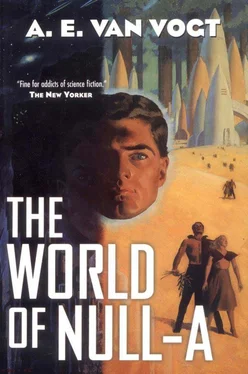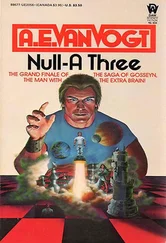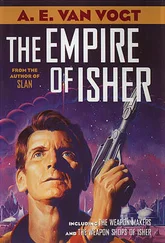Alfred van Vogt - The World of Null-A
Здесь есть возможность читать онлайн «Alfred van Vogt - The World of Null-A» весь текст электронной книги совершенно бесплатно (целиком полную версию без сокращений). В некоторых случаях можно слушать аудио, скачать через торрент в формате fb2 и присутствует краткое содержание. Жанр: Фантастика и фэнтези, на английском языке. Описание произведения, (предисловие) а так же отзывы посетителей доступны на портале библиотеки ЛибКат.
- Название:The World of Null-A
- Автор:
- Жанр:
- Год:неизвестен
- ISBN:нет данных
- Рейтинг книги:4 / 5. Голосов: 1
-
Избранное:Добавить в избранное
- Отзывы:
-
Ваша оценка:
- 80
- 1
- 2
- 3
- 4
- 5
The World of Null-A: краткое содержание, описание и аннотация
Предлагаем к чтению аннотацию, описание, краткое содержание или предисловие (зависит от того, что написал сам автор книги «The World of Null-A»). Если вы не нашли необходимую информацию о книге — напишите в комментариях, мы постараемся отыскать её.
It tells the story of Gilbert Gosseyn, a man living in an apparent utopia in which those with superior understanding and mental control rule the rest of humanity. But when Gosseyn wants to be tested by the giant Machine that determines such superiority, he finds that his world is not as it appears.
The World of Null-A — читать онлайн бесплатно полную книгу (весь текст) целиком
Ниже представлен текст книги, разбитый по страницам. Система сохранения места последней прочитанной страницы, позволяет с удобством читать онлайн бесплатно книгу «The World of Null-A», без необходимости каждый раз заново искать на чём Вы остановились. Поставьте закладку, и сможете в любой момент перейти на страницу, на которой закончили чтение.
Интервал:
Закладка:
Gosseyn, who had never thought of danger from the Machine, rasped, “But I don't understand. What's going on?”
The Machine's voice seemed to come from a long way off. “Your work is done,” it said. “You have accomplished your purpose. Now you must give away to the third and greatest Gosseyn. It is possible,” the cool voice went on, “that you could learn to integrate your extra brain in this body, given time. But there isn't time available. Accordingly, you must make way for Gosseyn III, whose brain will be integrated from the moment he comes to conscious life.”
“But that's ridiculous,” Gosseyn said jerkily. “I can't kill myself.” He controlled himself with an effort. “Why can't this-this third Gosseyn come to life without my dying?”
“I don't know too much about the process,” said the Machine. “Since I last saw you, I have been told that the death of one body is recorded on an electronic receiver, which then triggers the new body into consciousness. The mechanical part of the problem seems very simple, but the biological part sounds intricate.”
“Who told you this?” Gosseyn asked tautly.
There was a pause, then a slot opened and a letter slid out of it. “I receive my instructions by mail,” said the Machine matter of factly. “Your second body was delivered to me by truck, with that note attached.”
Gosseyn picked up the sheet and unfolded it. A typewritten message had been printed on otherwise blank paper:
Ship body of Gosseyn II to Venus and have one of your roboplane agents deposit it in forest near Prescott home. When he leaves this residence, pick him up and set him down near Crang's tree home with instructions to surrender himself. Give him information about Venus, and take any necessary precautions.
The Machine said, “Nobody ever questions my shipments to Venus, so that was no problem.”
Gosseyn reread the note, feeling fault. “But is this all you know?” he managed to say finally.
The Machine seemed to hesitate. “I have received one message since then, to the effect that the body of Gosseyn III will shortly be delivered to me.”
Gosseyn was pale. “You're lying,” he said harshly. “You're telling me that so that I'll have an incentive to kill myself.”
He stopped. He was talking about the act, discussing it as if it was something to be argued. Whereas the reality was that it wasn't a matter of not killing himself because of this or that or the other. He wasn't killing himself-just like that. Without another word he turned and strode out of the cubbyhole, out of and away from the Machine.
All through that day he was a man torn by a mixture of amazement and despair. By evening the high fever of restlessness was beginning to recede. He felt tired and unhappy, but also much more thoughtful. The Machine had not even suggested that he try to get the Distorter, perhaps because it could not imagine him succeeding.
As he ate dinner he visualized how it might be done. Phone Patricia and make an appointment with her in her apartment. Surely he could persuade her to see him some time during the following day, without any of the others knowing about it. The attempt had to be made.
He phoned her as soon as he had eaten. There was a slight delay after he gave his name, and then her face came on the video plate. Her face lighted, but she said hurriedly, “I can't talk to you more than a minute. Where can we meet?”
When he told her she frowned at him, started to shake her head, and then stared at him thoughtfully. She said finally, slowly, “This sounds awfully risky to me, but I'm willing to take the chance if you are. One o'clock tomorrow, and the important thing is, don't run into Prescott or Thorson or Mr. Crang as you come in.”
Gosseyn told her gravely that he would be careful, said good-by, and hung up. It was Prescott that he met.
XXI
A famous Victorian-era physicist said, “There's nothing for the next generation of physicists to do except measure the next decimal place.” In the next generation . . . Planck developed the quantum theory that led to Bohr's atomic structure work. . . . Einstein's mathematics were proven out by some extremely delicate decimal place measuring. . . . Obviously, the next question is going to involve the next set of decimal places. Gravity is too little understood. So are magnetic field phenomena. . . . Sooner or later somebody will slip in another decimal place, and the problem will be solved.
J. W. C., Jr.Gosseyn walked up to the main entrance a few minutes before one o'clock. He was not alone. Men and women moved in and out of the great doors, and their presence threw a sort of fog around him, hiding nun from close observation. There was, of course, the necessity of passing the guard office inside the entrance. Gosseyn peered into the glass wicket at the chunky individual who sat there.
“My name is Gosseyn. I have an appointment with Miss Patricia Hardie for one o'clock.”
The man ran his finger down a list of names. Then he pressed a button. A long young man in uniform popped out of a door near the wicket. He took Gosseyn's brief case and led the way to an elevator, the doors of which were just opening. One of the three people who came out was Prescott. He stared at Gosseyn in surprise. His face darkened.
“What brings you back here?” he asked.
Gosseyn braced himself. There was nothing to do but make the best of the fantastically bad luck. He had a vague plan for such a meeting as this, but his heart sank like a lead weight as he said the words he had prepared: “I have an appointment with Crang.”
“Eh? Why, I just left Crang. He didn't mention that he was seeing you.”
Gosseyn remembered that Prescott didn't know that Crang was a null-A supporter. All things considered, that was very fortunate.
“He's giving me a few minutes,” he said. “But maybe you've got some ideas on what I have to say.”
Prescott stood, cold, watchful, suspicious, as Gosseyn described his visit to the Machine and how the Machine wanted him to kill himself so that a third Gosseyn might appear. He omitted what the Machine had told him of the attack on Venus, and finished darkly, “I've got to see that third body. I'm just enough of a null-A not to believe in the triplicate even after I've seen the duplicate. Imagine anybody expecting a person of my sanity training to blow out his brains.” He shuddered involuntarily. “I'm looking for clues,” he said. “I even thought of coming to talk with Thorson. Somehow”–he looked hard at the other–“after last night, I didn't think of you.”
Prescott's countenance showed no hint of his reaction to the night before. He turned, started to walk away, then came back. He stood staring at Gosseyn. His manner remained coldly hostile, but his eyes were curious.
“As you've probably guessed,” he said, “we're looking for other bodies of yours.”
Gosseyn's impulse had been to get away from Prescott. Now he felt a chill. “Where have you looked?” he asked.
Prescott laughed harshly. “At first we had some pretty wild ideas. We made soundings from the air for caves, and we searched in out-of-way places. But now we've grown a little smarter.”
“What do you mean?”
“The problem,” Prescott continued, frowning, “is greatly complicated by a law of nature, of which you have probably never heard. The law is this: If two energies can be attuned on a twenty-decimal approximation of similarity, the greater will bridge the gap of space between them just as if there were no gap, although the juncture is accomplished at finite speeds.”
“That,” said Gosseyn, “sounds like pure Greek.”
Prescott laughed, louder this time. “Think of it this way, then,” he said. “How do you explain the fact that you have in your mind the details of what Gosseyn I did and thought? You must have been attuned, you and he; in fact, it is the only theoretically sure method of thought transmission-you have to do it with yourself. Anyway, it didn't matter where you were; his thoughts, being alive, would have been the stronger, and would have flashed to you wherever you were within the limits of reachable space. I won't define those limits.”
Читать дальшеИнтервал:
Закладка:
Похожие книги на «The World of Null-A»
Представляем Вашему вниманию похожие книги на «The World of Null-A» списком для выбора. Мы отобрали схожую по названию и смыслу литературу в надежде предоставить читателям больше вариантов отыскать новые, интересные, ещё непрочитанные произведения.
Обсуждение, отзывы о книге «The World of Null-A» и просто собственные мнения читателей. Оставьте ваши комментарии, напишите, что Вы думаете о произведении, его смысле или главных героях. Укажите что конкретно понравилось, а что нет, и почему Вы так считаете.










